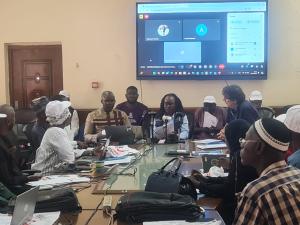WHO Celebrates World Malaria Day, Highlights Progress and Challenges
Banjul, The Gambia - In a poignant celebration marking World Malaria Day, WHO Gambia joined hands with the National Malaria Control Program (NMCP) and other key stakeholders to underscore the ongoing battle against malaria. Held at the National Malaria Control Programme complex in Kanifing, the event, themed "Advancing Health Equity, Gender Equality, and Human Rights," focused on the critical need for equitable malaria services amidst the disease's resurgence globally.
Dr. Momodou T. Nyassi, Deputy Director of Health Services at the Ministry of Health, emphasized the significance of this year's theme, highlighting the particular vulnerabilities of pregnant women and young children. He acknowledged the various challenges communities face, such as limited access to healthcare services and the new threats posed by climate change, while also showcasing the substantial progress made towards malaria elimination since the Abuja Declaration in 2000.
Dr. Jane Maina, WHO Country Representative for The Gambia, lauded the strides made by The Gambia and other African nations despite the hurdles presented by the global pandemic. She stressed that the fight against malaria is far from over, pointing out that the WHO African Region still bears the heaviest burden of malaria cases and deaths worldwide. "In 2021 alone, the region accounted for over 95% of malaria cases and 96% of deaths. Therefore, it is imperative that we accelerate our progress if we are to achieve the ambitious targets set for 2025 and 2030," Dr. Maina said.
Despite significant advancements in reducing malaria cases and deaths in The Gambia, the disease continues to pose a threat to public health, with the entire population at risk of infection. Malaria transmission occurs annually, with approximately 90 percent of cases emerging during the latter part of the rainy season, from September to December. Over the past decade, The Gambia has made considerable progress in reducing malaria morbidity, with national malaria incidence declining by 70 percent—from 149 per 1,000 people in 2011 to 44 per 1,000 people in 2022. In light of both recent progress and ongoing challenges, The Gambia’s National Malaria Strategic Plan 2021-2025 aims to shift from controlling the spread of malaria to achieving its elimination. This strategic plan emphasizes comprehensive coverage of quality programs in high transmission areas and sets two primary goals for 2025: attaining zero malaria deaths and achieving zero indigenous malaria transmission across all regions of the country.
The WHO has played a pivotal role in malaria control and prevention efforts in The Gambia and beyond. Through initiatives such as the distribution of insecticide-treated bed nets, indoor residual spraying, and Seasonal Malaria Chemoprevention (SMC), WHO has significantly contributed to the 70% decline in malaria incidence in The Gambia over the past decade. These efforts have been crucial in protecting vulnerable populations, especially young children and pregnant women, from the debilitating effects of malaria.
Moreover, WHO's collaboration with partners such as the US President's Malaria Initiative (PMI), Gavi, and The Global Fund has been instrumental in mobilizing resources and fostering innovative solutions to combat malaria. This year's celebration also recognized the vital contributions of Catholic Relief Services (CRS), whose partnership with NMCP since 2006 has had a lasting impact on malaria interventions in the region.
Despite these successes, the journey towards malaria elimination remains fraught with challenges. Dr. Maina pointed out the emerging issue of urban malaria, which necessitates tailored interventions to address the unique needs of both rural and urban communities. Additionally, the ongoing threat of climate change poses new risks, demanding adaptive strategies to maintain the gains achieved thus far.
The Gambia's National Malaria Strategic Plan 2021-2025 outlines a comprehensive approach to transition from malaria control to elimination, aiming for zero malaria deaths and zero indigenous transmission by 2025. However, achieving these ambitious goals requires sustained efforts and continued collaboration among all stakeholders.
In closing, Dr. Maina called for a renewed commitment to the fight against malaria, emphasizing that it is not just a medical challenge but a moral imperative. "Let us unite our efforts, across borders and communities, to eradicate malaria from The Gambia, from Africa, and from the world. Together, we can achieve a future where no child dies from this preventable disease, where no family lives in fear of its devastating impact," she said.
As The Gambia commemorates World Malaria Day, the event serves as a reminder of the significant progress made and the critical work that remains. With continued support and collaboration, The Gambia and its partners are poised to make further strides in the battle against malaria, ultimately paving the way for a healthier, more equitable future for all.



